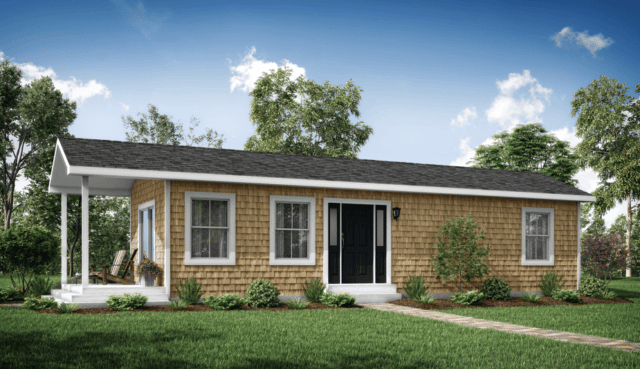
The iconic Hyannis Harbor lighthouse. Changes allowing small apartments in many single-family zones on Cape Cod have created business opportunities for lenders and homebuilders.
After two years of housing market chaos, could Cape Cod be at a tipping point pointing toward a future with more plentiful homes?
Some residents hope so. And instead of big multifamily complexes bringing hundreds of units online, they’re looking to the hobbits of the real estate world – accessory dwelling units, also called “ADUs” – to take down this giant problem with hundreds of little cuts all at once.
Carved out of or built on the same plot as an ordinary single-family house, these smaller apartments are cheaper and faster to build than a typical apartment building, advocates say. They don’t run afoul of tight wastewater restrictions. And they let older homeowners give their children an affordable home or a not-insignificant passive income stream while they age in place.
With another Cape Cod-based bank launching a product to help finance ADU construction, a prominent developer unveiling standard designs and a housing advocacy group standing up a suddenly popular service to help interested homeowners navigate the construction process, a critical mass of resources could be coming online.
“As education increases and awareness of availability of this product, I like to hope we’ll see a big increase in demand, mainly based on the fact that this should help homeowners with their own individual finances as well,” said Charlotte North, assistant vice president and residential mortgage sales manager at The Cooperative Bank of Cape Cod. “It’s great to help fix the [housing] need, but people are most often incented when there’s a benefit for them as well.”
High Barriers to New Homes
Cape Cod is unlike any housing market from an Economics 101 textbook.
First, 37 percent of the homes don’t count toward housing the year-round population. According to the Cape Cod Commission, that’s roughly how many of Barnstable County’s over 164,000 homes are used as seasonal accommodations. Their owners spend months or even weeks in them every year, rent them out to sun-seeking strangers or both.
Second, water pollution problems from too many septic tanks mean the number of bedrooms each Cape Cod home can host is strictly limited, said Kristi Senatori, executive director of the Cape Cod Commission, the county-wide planning agency. The aim is to prevent too much nitrogen – the main ingredient in human waste – from seeping into the peninsula’s ponds and the ocean through groundwater and destroying aquatic ecosystems.
Stuck between these two tough realities, and with data from the federal Department of Housing and Urban Development showing that 1 in 3 Cape Codders are forced to spend at least one-third of their income on housing, ADUs offered hope.
“We realized we didn’t have a problem with the number of units, we had a problem with how they were used,” said Alisa Magnotta, CEO of the Hyannis-based housing advocacy and homelessness prevention nonprofit Housing Assistance Corp.
But until recently, local zoning laws effectively smothered any attempt to build new rentals like these.

A computer rendering of Hyannis developer CapeBuilt’s “Covell” design for an accessory dwelling unit currently being marketed to residents of Cape Cod communities liberalizing their ADU bylaws. Image courtesy of CapeBuilt
‘A Crisis Point’
Before the pandemic, Barnstable already had laws on the books letting residents convert spaces like basements into apartments for relatives, or which required new ADUs to be deed-restricted affordable housing and go through what amounted to a special permit process, said town Director of Planning and Development Elizabeth Jenkins, akin to what a traditional developer has to go through to build a much bigger building.
“That’s a really tough process for homeowners to go through!” Jenkins said. “We saw many people start the process and say they just couldn’t.”
The pandemic pushed the region’s long-simmering housing problems to “a crisis point” last summer, Jenkins said, and changed the political conversation around ADUs and development.
Legions of off-Cape homebuyers flooded the housing market starting in the summer of 2020, driving the median home sale prices up between 35 percent and 44 percent across Barnstable’s constituent villages over two years, according to The Warren Group, publisher of Banker & Tradesman. Local officials started calling housing problems a “near-existential crisis” for the region last year as business after business was left strapped for workers priced out of apartments or left without homes entirely, forcing them to move.
“Nurses and technicians at the hospital, folks who staff and manage restaurants, who are in the banks, who work in the marinas, who are teaching tennis lessons – all the people who make Cape Cod this charming vacation spot have had their rental homes and apartments just sold out from under them, either to investors who are looking to acquire and do short-term rentals through Airbnb or others, or for folks who have the means and desire to have a more permanent home on the Cape.” said Rob Brennan, CEO of Hyannis developer CapeBuilt and a member of the Barnstable County Economic Development Council.
ADUs offered Barnstable a creative way to start attacking the region’s housing problem without raising hackles about neighborhood character, Jenkins said, or waiting for major wastewater infrastructure projects to be built.
The town’s new bylaw – based on a model drafted by the Cape Cod Commission pre-pandemic – is one of the more liberal in the region, allowing seasonal residents to carve a year-round rental out of their summer home, so long as both the main home and the new unit aren’t rented at the same time and the total number of bedrooms on a property doesn’t change.
“If you come in with a design-build company that knows the process, it’s as long as it takes to get a building permit. We usually approve those in about a month,” Jenkins said.
Twelve of the 15 Cape towns have now adopted modern ADU regulations thanks to a coalition of concerned residents, advocates like the Housing Assistance Corp. and business groups like the Cape Cod & Islands Association of Realtors, which played a major role financing the five-year effort. The Cape Cod Commission has assembled detailed information on the differences in each town’s ADU laws.

A roofer nails down asphalt shingles to a home under construction. High construction costs and an oversubscribed construction industry on Cape Cod could help delay construction of significant numbers of accessory dwelling units for a year.
Banks, Builders See Business Opportunity
The sea change in regulation has opened up business opportunities in what some see as a market with growth potential.
Brennan’s firm CapeBuilt has developed a series of one-bedroom, slab-on-grade designs it can deliver as a modular home or build on-site. The designs are cozy, but efficient: The 536-square-foot Covell’s open-plan kitchen and family room leads out to an optional porch through a sliding glass door.
Potential rents for ADUs range from “the low 1,000s” of dollars for a unit carved out of an existing home to “the high 2,000s” for a free-standing unit with multiple bedrooms, he said.
While Brennan was reluctant to put figures on his estimates for the potential size of the ADU market, he said the potential exists for a small ADU construction and conversion industry to develop in the coming years.
“We see that product line and that demand as going to continue to grow” over the next three to four years, Brennan said.
And this spring, the company plans to start launching information sessions for homeowners in its Hyannis showroom, complete with presentations by local lenders about financing options.
Cape Cod 5 developed an ADU loan product several years ago for customers on Nantucket, where zoning allows units to be built by right. While the product has not yet seen the same kind of uptake in Barnstable County that it has had on Nantucket, the bank continues to receive inquiries about ADU financing, and some loans are in the pipeline, said Robert Talerman, Cape Cod 5’s co-president.
“It’s a great investment. It’s a feel-good that has financial heft to it.”
— Alisa Magnotta, CEO, Housing Assistance Corp.
Cape Cod 5 offers two products: a home equity line of credit and a traditional mortgage. The mortgage product allows for loans up to $1 million on 1- to 4-family primary residences and repayment terms up to 30 years. To help borrowers qualify, Cape Cod 5 will consider expected rental income as part of the underwriting process.
“There’s no single solution to the housing shortage and high cost of housing that we face, especially on the Cape and the Islands,” Talerman said. “This will help. This will create some housing units, and every housing unit is beneficial in the long run.”
The Cooperative Bank of Cape Cod, the newest entry into the ADU loan market with a product that launched in February, lets homeowners access funds through a cash-out refinance, a home equity line of credit or a home equity loan with low fixed rates.
In addition to using projected rents in the underwriting process, The Coop is also offering more flexibility in loan-to-value ratios compared to other products, said North, the bank’s residential mortgage sales manager.
North said The Coop has already received multiple inquiries from people who want to build these accessory dwelling units for aging parents and from older parents who want to build them for children who cannot afford to buy a house on the Cape. But increasing awareness about the idea and feasibility of ADUs is key.
“If people don’t know about it, they can’t use it,” North said. “Just looking into it can really make a big difference in opening up a lot of housing here on the Cape.”
Homeowners’ Interest Uncorked?
As awareness grows, however, many homeowners will need basic help finding their way through municipal bureaucracies.
Fairhaven-based First Citizens Federal Credit Union, which has four branches on the Cape, launched an ADU loan product in 2019. The credit union’s CEO, Peter Muise is the Housing Assistance Corp.’s board chair.
The product has not gained much traction with customers so far, said First Citizens Federal Credit Union’s Chief Lending Officer Patrick Neenan. Many homeowners considering ADUs found the process overwhelming, he said, from zoning and permitting to finding a contractor and figuring out the costs.
“Homeowners have not a clue,” said the Housing Assistance Corp.’s Magnotta. “They need an expert they can call to say, ‘Go down to the Water Department and get your septic plan to see how many bedrooms you can have. Go down to the assessor’s to get your lot lines.’”

James Sanna
For homeowners just getting started in their ADU journey, the Housing Assistance Corp. has recently stood up a technical assistance service to help navigate the process. Although the nonprofit won’t directly project-manage for homeowners, it will coach homeowners through the construction and will offer some initial guidance about landlording, said Magnotta, the executive director.
Only six weeks after its soft launch, and without even mounting an advertising campaign, Magnotta said the service had already fielded expressions of serious interest from 160 families.
“Some folks come in with their plans and all they need is a contractor. Some folks just have the idea. People are at very different places,” she said. “It really speaks to the idea that people want to help family members [getting priced out of the Cape] or they’re feeling the pain in the community. It’s also a great investment. It’s a feel-good that has financial heft to it.”

Diane McLaughlin
But the Cape’s higher-than-average labor costs – another longstanding trend made worse by the pandemic – and inflation in construction materials costs could limit how quickly ADUs take off.
“It’s expensive to build new on the Cape right now, period. I think it’s a market that’s going to evolve as more towns adopt some form of an ADU bylaw and as stabilization is brought to the construction industry in general in terms of labor and materials pricing,” CapeBuilt’s Brennan said. “The more attractive cost or price point is going to be the basement conversion or the garage conversion.”
Still, the recent spate of new ADU laws appears to have opened political space to talk about adding more housing on the Cape.
“I have an acre. I have a 2,000-square-foot house. There’s a lot of room there for an accessory dwelling unit. It’s not going to change the look and feel of my neighborhood,” Magnotta said. “I think people just have this historical, emotional response that they want to keep it the same. We’re kind of past that. We’re going to become a museum if we don’t allow year-rounders a place to live.”





